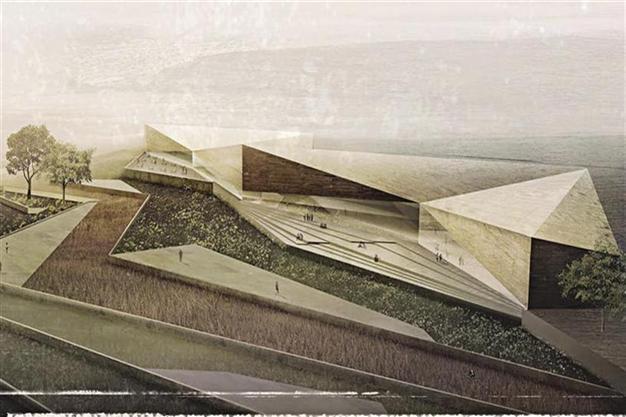Palestinian Museum reflects heritage and history of a nation
ISTANBUL - Hürriyet Daily News

The Palestinian Museum is dedicated to reflecting on modern Palestine and highlighting the modern and contemporary Palestinian experience.
The heritage and the 200-year-old history of Palestine are about to be revealed in a new museum, “The Palestinian Museum,” founded in Ramallah’s Palestinian village of Birzeit. The museum is expected to open for visitors in fall 2014.
According to Jack Persekian, the director of the museum, the vision of the Palestinian Museum is to be a leading, dynamic and innovative forum for creating and communicating knowledge and new thinking about Palestinian society, history and culture.
While the museum is dedicated to the exploration and understanding of the culture, history and society of Palestine and its people, it will also be a space that brings together an innovative mix of exhibitions, research, and education programs.
Persekian said the museum would be a place for inspiration, dialogue, and reflection. It aims to connect with Palestinians wherever they are in the world and with all those interested in Palestine through its digital platforms and international partners.
The Palestinian Museum is dedicated to the celebration and preservation of the tangible and intangible culture of Palestine over the past 150-200 years. “There is no particular theme to our collection as yet, except that the objects in our collection must have some connection to or represent the cultural heritage of Palestine or the Palestinians. We intend to build a permanent collection, but we still have a long way to go on that front. We plan to have rotating thematic exhibitions occurring at a frequency of two per year for the next few years,” said Persekian during an interview.
The modern PalestineThe museum is also dedicated to reflect to focus on modern Palestine and highlight the modern and contemporary Palestinian experience. Persekian said: “There are several museums in Palestine that present earlier eras of Palestinian history, but not so many that look at the modern period. We felt that this might be an opportunity to contribute to and expand the conversation about Palestinian history further. We’re also very keen to present Palestinian culture as a living culture.”
The team and the director of the museum envision the Palestinian Museum as a “transnational” institution that tries to reach out and engage with Palestinians, and anyone interested in Palestine, wherever they may be, in defiance of the political and physical borders that separate us from one another.
Persekian added that having a robust online presence was one sure way of reaching out to as many people as possible, in addition, of course, to the vast network of partner institutions and entities they were establishing in various places in the world in order to tangibly reach out and engage the different Palestinian communities in the world and through them to the rest of the world.
Persekian said, “The museum will be an innovative, world-class research and cultural institution that mobilizes Palestinians and encourages them to engage, ask questions, and create, while simultaneously engaging a global audience of scholars, researchers, and anyone interested in learning more about Palestinian culture, history and heritage.”
Noting that the goal was also to create a solid foundation of archival, cultural, and educational content through which new knowledge about Palestine can be produced and shared, Persekian said anyone interested in Palestinian culture would be able to find what they were looking for.
The opening exhibitionsThere are two planned exhibitions that the team of the museum is working on. “The first revolves around the theme of identity by telling the stories of ordinary people through objects they have kept with them, because of the way those objects invoke certain memories,” said Persekian, adding that it would go beyond those archetypical objects that have come to symbolize Palestinian identity and culture, like the keys and deeds to occupied homes, in order to reflect on the diversity, plurality and the evolution of the Palestinian identity over time and through triumphs and failures.
The second exhibition, he said, would look at Palestinian identity through the art and literature of non-Palestinians. This could also include those who don’t necessarily support the Palestinian cause and rights.
“We are looking for concepts that will eventually initiate discussions and that will have people question some of the issues that touch at the heart and core of the Palestinian existence,” said Persekian.
A political symbol
The Palestinian Museum is a political symbol only in so far that it celebrates the accomplishments of the Palestinian people in arts and culture, and that it affirms the presence of Palestinians as a people who have agency, who are productive, who shape their own histories in spite of all the calamities that had befallen them.
It is political in the sense that it provides spaces and opportunities for Palestinians to shape their own historical narrative and to engage with it.

